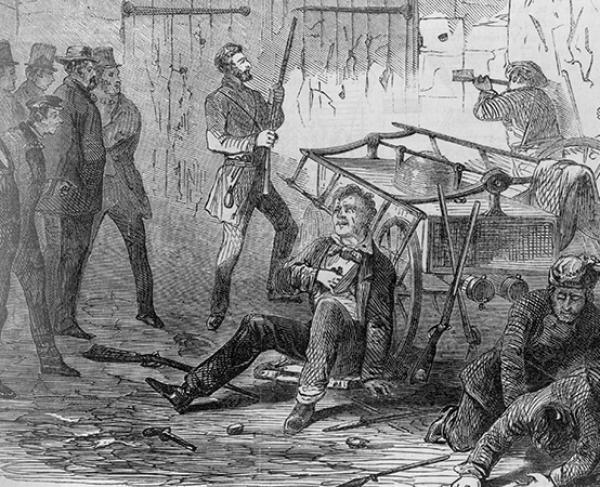Bravery Under Fire: Captain John H. Brown’s Heroic Legacy at Vicksburg
A Message Through Fire: Captain John H. Brown’s Medal of Honor at Vicksburg

Estimated Reading Time: 6 minutes
Author: NateW (GreyFriar)
Key Takeaways
- Captain John H. Brown earned the Medal of Honor for delivering a vital message through enemy fire at Vicksburg
- His brave action on May 19, 1863 helped coordinate Union forces during a major assault
- Born in Boston in 1842, he served as a Captain in the 47th Ohio Infantry
- After the war, he worked as a letter carrier in Cincinnati until his death in 1898
Table of Contents
Early Life and Background
John H. Brown was born in 1842 in Boston, Massachusetts. Like many young men of his generation, he would answer the call to serve when civil war erupted across the nation. Moving west to Ohio before the conflict, Brown made his home in Cincinnati where he would eventually enlist in the Union Army.
Military Service
Brown joined the 47th Ohio Volunteer Infantry Regiment, which was organized at Camp Dennison near Cincinnati. Rising through the ranks to Captain, he served with distinction in one of the war’s most strategically important campaigns – the siege of Vicksburg, Mississippi.
The 47th Ohio was part of Brigadier General Hugh Ewing’s Third Brigade in Major General William T. Sherman’s XV Corps. They participated in the major assaults on Vicksburg’s defenses on May 19 and May 22, 1863, fighting valiantly against determined Confederate resistance.
The Medal of Honor Action
On May 19, 1863, during the first major Union assault on Vicksburg’s defenses, Captain Brown performed an act of extraordinary bravery that would earn him the nation’s highest military honor. With Union forces attempting to coordinate their attacks against the Confederate stronghold, communication between units became critical.
In the midst of what his Medal of Honor citation describes as “terrific fire,” Brown volunteered to carry a vital verbal message from Colonel A.C. Parry to General Hugh Ewing. What made his action especially noteworthy was that he had to move across ground that was completely exposed to enemy fire.
His Medal of Honor was awarded over three decades later, on August 24, 1896, recognizing his “gallant and meritorious” service during this pivotal campaign. View his official Medal of Honor citation here.
Post-War Life and Legacy
After the war, Brown returned to Cincinnati where he became a letter carrier for the U.S. Postal Service. He married Latvian B. Davis, a Cincinnati native, and together they raised a family in the city’s 16th Ward. Their daughter Lillie was born in Colorado, suggesting the family may have spent time in the western territories before settling permanently in Ohio.
Tragedy struck the family in 1877 when their daughter Grace Ella died shortly after birth on April 14. Brown continued his postal service work until his death on August 7, 1898, in Dearborn County, Indiana. He was laid to rest at Spring Grove Cemetery in Cincinnati.
FAQ
Q: When did John H. Brown receive his Medal of Honor?
He was awarded the Medal of Honor on August 24, 1896, over 30 years after his heroic action at Vicksburg.
Q: What was his role in the 47th Ohio Infantry?
He served as a Captain in the regiment, which was part of Ewing’s Brigade in Sherman’s XV Corps.
Q: Where is he buried?
Captain Brown is buried at Spring Grove Cemetery in Cincinnati, Ohio.
Q: What was his civilian occupation after the war?
He worked as a letter carrier for the U.S. Postal Service in Cincinnati.
Sources
- Official Medal of Honor Citation Records
- Vicksburg National Military Park Historical Records
- Civil War Service Records, National Archives
- Cincinnati City Directories, 1870-1898
- Spring Grove Cemetery Records
- U.S. Census Records 1870-1880
